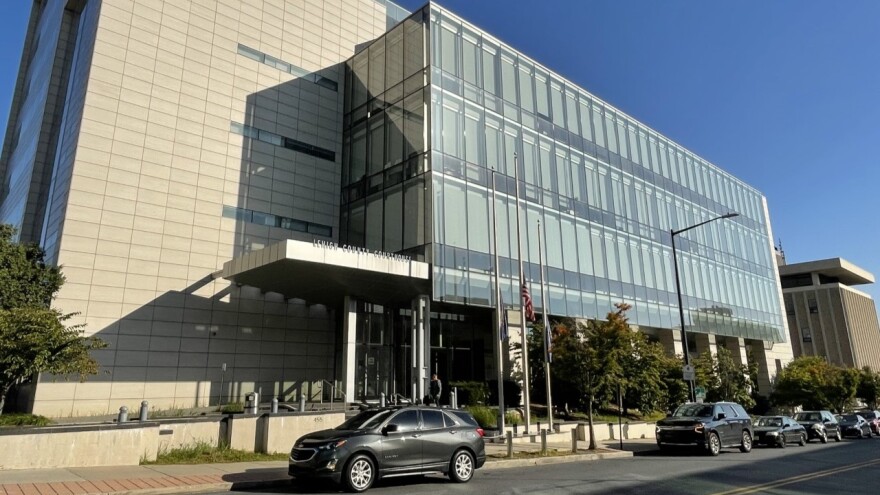EDITOR'S NOTE: Just as the old saying goes, “Don’t judge a book by its cover.” As there is a wealth of information contained within any tome, news stories often have far more to say than one headline might be able to share.
With that in mind, this is the first installment of Reporter's Notebook, an occasional series that will offer deeper looks into recent news articles by the LehighValleyNews.com staff.
ALLENTOWN, Pa. — It was a court case that could have caused counties throughout the state to reevaluate how they operate and monitor election drop boxes in the upcoming elections.
- Petitioners called for in-person monitoring of election drop boxes and a limit to the operation of the county's sole 24-hour drop box
- The decision was discussed in a small courtroom with about 30 people, and it occurred with little fanfare
- Judge Capehart found that the court should not interfere with the county’s decisions and that the election board has taken steps to protect election integrity
Instead, a Lehigh County judge late last month — a little more than two weeks before the election — sided with Lehigh County, ruling that the county's Board of Elections acted properly and followed the state's election code in its use of the boxes.
That allowed the boxes to be used for the Nov. 8 election just as they have been.
The decision came after testimony in a hearing earlier last month in which several voters said the boxes were vital to their ability to vote.
But the judge's ruling relied more heavily on the fact that no actual problems with the boxes could be cited, and that monitoring to the extent being asked by plaintiffs in the suit would be prohibitive, if not impossible.
The case
In the case of Gill versus the Lehigh County Board of Elections, petitioners had called for in-person monitoring of election drop boxes and a limit to the operation of the county's sole 24-hour drop box.
The case was brought by America First Legal, a conservative group founded by Mark Meadows and Stephen Miller, officials for former president Donald Trump.
The first petitioner on the case was Sean Gill, the vice president of the Lehigh County Republican Committee. In fact, all of the petitioners in the case, which challenged the county’s election board -- Gill, Robert Smith, Tim Ramos and Jackie Rivera – were all notable figures in the region’s Republican party.
Smith currently is running for the open 22nd District state House seat.
The argument focused on how the county’s election drop boxes should be monitored and whether the county should be permitted to operate a 24-hour drop box.
In the courtroom
Like many decisions that could affect the future of democracy, this one was discussed in a small courtroom with about 30 people, and it occurred with little fanfare.
Early in the day, Sarah Murray, an attorney for Lehigh County, brought forward Jody Weinreich, president of the Pennsylvania Alliance for Retired Americans, to testify in support of drop boxes.
In September, Weinreich’s group filed a petition to intervene in this case, which was granted.
Weinreich argued that more than 8,700 members of her organization could rely on drop boxes in the upcoming election.
“If they do away with these drop boxes and mail-in ballots, a lot of seniors won’t be able to get out to vote,” she told the court.
While on the stand, Weinreich testified in support of 24-hour drop boxes, saying seniors often need to prepare for outings, which can make it difficult for some if a drop box only follows regular business hours.
“You don’t know the weather or how you’re going to feel that day,” she said, in support of longer drop box availability.
She said that also helps seniors who worry they might not make it out to the polls on election day.
The next witness to testify, Barbara Kremp from Whitehall Township, was also a member of PARA.
She explained that she always saw voting as a duty.
“I feel like people died so I can vote,” she testified.
But Kremp also said that like many seniors, she has issues that can keep her from being certain she would make it to the polls on election day.
In fact, she said she cares for her ailing mother and often can find herself sidetracked because of it.
“I don’t actually know all the time what my days are going to be,” she said.
‘No fraud observed’
In preparing to call the next witness, Wally Zimolong, attorney for the America First Legal Foundation, told the court that his argument for ballot box monitoring and limited drop box hours at the county's 24-hour drop box came from a desire to prevent election fraud.
“We are asking for these drop boxes to be monitored to ensure there is no third-party dropping of ballots,” Zimolong said.
He brought Lehigh County District Attorney Jim Martin to the stand. In the past, Martin had called for in-person monitoring of election boxes. He suggested the election board have employees monitor the county’s drop boxes for this year’s election.
And, in a previous primary election, Martin had law enforcement officials monitor boxes — a move that was widely criticized.
Testifying in court, Martin focused on his concern that over an 18-day span during the primary election, law enforcement officials found 186 cases of individuals dropping multiple ballots in a drop box.
He argued that this is a crime that he as a law enforcement official is tasked with preventing.
However, Martin admitted he did not prosecute anyone who dropped multiple ballots in a drop box following the primary elections even though he had warned he would. He said he believed these cases were individuals mistakenly dropping off ballots for loved ones but not examples of fraud.
“I suppose it depends on how you define fraud," Martin replied when asked if there was evidence of ballot fraud. "But no, I would say not. I would say there was no fraud observed."
He also noted that the county put up signs to deter voters from making that mistake in this year’s elections.
“I suppose it depends on how you define fraud, but no, I would say not."Lehigh County District Attorney Jim Marin
Lehigh County Chief Clerk of Elections Tim Benyo took the stand next to detail the reality of the petitioners’ call for in-person monitoring.
Benyo said that to be able to provide that kind of monitoring — on top of the constant surveillance cameras already in place — would be prohibitive, if not impossible.
“Currently we don’t have the time or staff available to provide in-person monitoring,” Benyo said.
He said that along with having to prepare volunteers for the upcoming election, his office would need to set up at least four people to monitor every one of the county’s five mail-in ballot drop boxes.
He explained that each party would have an in-person monitor. An interpreter would be required at every location for Spanish-speaking voters, and a security officer would be needed at every drop box.
With the election right around the corner, Benyo said that would be tough to accommodate.
“Time and personnel would be the biggest hurdle,” he told the court.
Petition denied
After hearing testimony, Judge Capehart gave both sides of the argument several days to provide follow-up documents.
He rendered a ruling a little over a week later, finding that the court should not interfere with the county’s decisions and that the election board “has seen fit to take steps to protect election integrity and comply with Pennsylvania law.”
In his ruling, Capehart broke down the elements of the case and detailed his reasoning for denying the petitioners’ request.
For instance, Capehart noted that both sides agreed that having a third party drop off multiple ballots at an election drop box is a violation of the state’s election code.
But the judge found no reason that the ballot boxes needed to be manned by in-person monitors to prevent that from happening.
“Petitioners have failed to cite any provision in the Election Code mandating those specific actions be taken,” Capehart wrote.
He also noted that in-person monitoring could have an unintended side effect.
“While seemingly innocuous, in-person monitoring as advanced by petitioners is more likely than not to have the unintended result of in-person intervention at the drop box sites and may unduly interfere with voters lawfully returning their ballots to the drop box,” Capehart wrote.
He also found that any concern over third parties delivering mail-in ballots to election drop boxes was speculative. He said that while some individuals placed more than one ballot in a drop box during the primary election, “it may not happen in the next election.”
As to the petitioners’ request to limit the hours of the county’s sole 24-hour drop box, Capehart noted that the election code “is silent” on whether drop boxes should be limited to regular business hours.
Capehart found that the county’s election board followed the state's election code, and in cases that aren’t clearly dedicated by that code, the court would not second guess the election board’s decisions.


